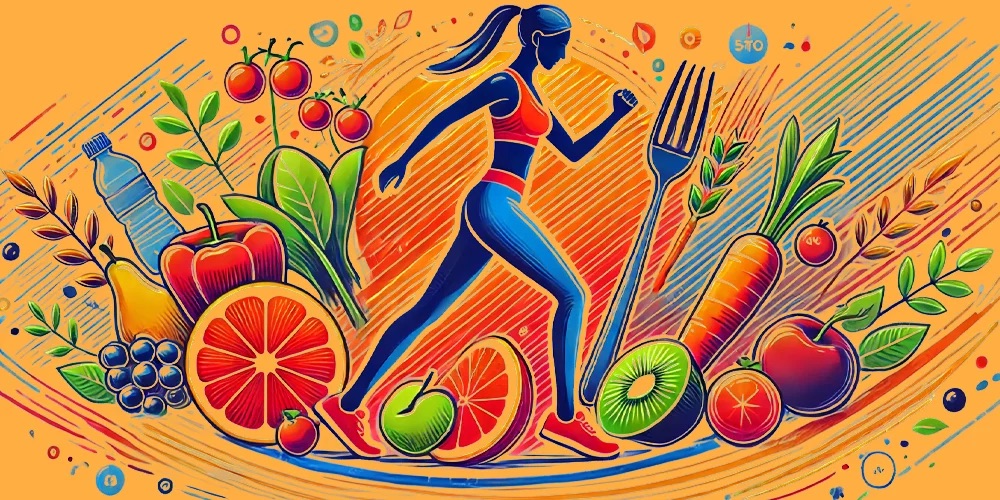Losing weight is a complex process that goes beyond simply counting calories. It requires an understanding of the various factors that influence energy expenditure and fat burning. In this blog article, you’ll learn what conditions need to be met to effectively lose weight and why a holistic approach that includes both nutrition and physical activity is the most promising.
Conditions for Losing Weight
To lose weight, a calorie deficit must be achieved, meaning the body must burn more calories than it consumes. Calorie burning is composed of the following three components:
- Basal Metabolism: Basal metabolism is the energy the body consumes at rest to maintain vital functions such as breathing, heartbeat, and cell repair. It accounts for the largest portion of daily calorie expenditure—about 60% to 75%.
- Activity-Induced Thermogenesis: This includes the calories burned through physical activity, including sports and daily movements. The percentage varies greatly depending on activity level and accounts for about 15% to 30% of daily calorie expenditure.
- Diet-Induced Thermogenesis: This part refers to the energy the body needs to digest and metabolize food. It contributes about 10% to daily calorie burning.
Why Running Alone Often Isn’t Enough to Lose Weight
Many people start running to lose weight, only to find that despite their efforts, they don’t achieve the desired results. A 60-minute run burns about 500 to 700 kilocalories (kcal), which, with a daily calorie consumption of about 2,500 to 3,000 kcal for men and 1,800 to 2,200 kcal for women, might seem like a significant amount. However, it’s important to understand that these burned calories can quickly be regained with certain foods, making the weight loss process more challenging.
To clarify the effect of simple renunciations or portion adjustments:
- Skipping a chocolate bar: Saves about 250-300 kcal—roughly half the calorie burn of an hour-long run.
- Skipping a large glass of cola (0.5 liters): Saves about 200-250 kcal.
- Skipping a small portion of French fries: By avoiding a standard portion of about 150 g, you can save about 400 kcal.
- Eliminating calorie-dense sides: For example, leaving out mayonnaise on a sandwich can save about 100 kcal. Combined with skipping another calorie-dense side like butter on bread, you could save a total of 200-300 kcal.
- Skipping a glass of beer (0.5 liters): Saves about 200-250 kcal.
- Choosing a whole grain roll instead of a croissant: Saves about 150 kcal, which, along with skipping another snack, could save about 300 kcal.
Additionally, many people experience increased appetite after running and tend to eat more than they burned during the run. Looking at the list above, it becomes clear how easily the calories burned while running can be regained through unthoughtful eating. Targeted replacement of calorie-dense snacks with healthier options like fruits, vegetables, or nuts can help satisfy hunger without excessively burdening your calorie intake.
Another obstacle is that the body adapts to regular running and becomes more efficient at consuming energy. This means that, over time, fewer calories are burned with the same effort. This adaptation process can make weight loss more difficult but can be mitigated by a conscious dietary adjustment. For example, replacing sugary drinks with water or unsweetened teas can save additional calories while also reaping the benefits of a lower-calorie diet.
Why Exercise Is Still Important When Trying to Lose Weight
Despite the challenges that exercise can pose in relation to weight loss, it is an indispensable component of a successful weight loss program. Exercise plays a central role in increasing calorie expenditure and keeping the body fit. But that’s not all.
A key reason why exercise is so important is the preservation of muscle mass. Physical activity, especially strength training, helps maintain or even build muscle mass. This is crucial because muscle tissue burns more calories than fat tissue, even at rest. With more muscle mass, basal metabolism increases, which can significantly ease the process of losing weight.
Moreover, exercise helps better adhere to calorie restrictions. Regular exercise can heighten awareness of your own diet and help keep calorie intake in check. Studies show that people who exercise regularly are more likely to stick to their diet goals and therefore lose weight more successfully. This self-discipline in managing nutrition is further supported by the positive effects of exercise.
Another important aspect is minimizing the reduction in energy expenditure. When losing weight, the body tends to lower basal metabolism, which can slow down weight loss. Exercise can counteract this natural adaptation process by increasing total energy expenditure. This reduces metabolic adaptation, making it easier to maintain a calorie deficit.
Conclusion
While running can be a valuable method for burning calories, it often isn’t enough on its own to achieve the desired results. By making adjustments to eating habits and incorporating exercise, especially strength training, the calorie deficit can be effectively increased, thus supporting the weight loss process.
Tips for Sustainable Success:
- Manage your diet consciously: Small changes, such as giving up sweets or cutting out soft drinks, can have a big impact. Try to replace calorie-dense snacks with healthier alternatives.
- Exercise regularly: Incorporate both endurance and strength training into your workout routine to maximize fat burning and maintain muscle mass.
- Take a long-term perspective: Aim for sustainable changes in your lifestyle rather than quick diets. Patience and consistency are key.
- Listen to your body: Pay attention to how your body reacts to different forms of exercise and diet, and adjust your strategy accordingly.
- Set realistic goals: Set achievable goals and celebrate small successes to stay motivated.



One reply on “Losing Weight by Running: Why Nutrition Is Just as Important as Exercise”
Hi
How about menopause, dietary and running? The metabolism in a woman’s body change when the per menopausal phase starts. Could you something on this subject? Thank you.